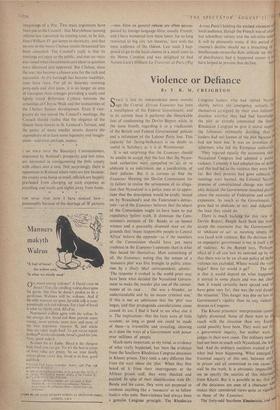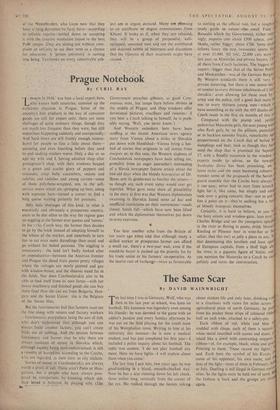Violence or Defiance
By T. R. M. CREIGHTON
SiNcE it lost its independence some months ago the Central African Examiner has been a mouthpiece of the Federal Government; and in its current issue it performs the remarkable feat of condemning the Devlin Report while, in the same breath, regarding it as a vindication of the British and Federal Governments' policies' and a refutation of the Labour Party line. This capacity for facing-both,...ways is no doubt as useful in Salisbury as it is at Westminster.
It is not surprising that the Examiner should be unable to accept that the fact that the Nyasa- land authorities were compelled to -act or to abdicate is an indictment, not a justification, of their policies. But it is curious to find the Examiner blaming the Devlin Commission for its failure to realise the seriousness of its allega- tion that Nyasaland is a police state or to appre- ciate that the description would be avidly 'seized on by Nyasaland's and the Federation's detrac- tors'—as if the Examiner believeS that the object of the Commission ought to have been to put expediency before truth. It dismisses the Com- mission's estimate of Dr. Banda as an honest witness and a peaceably disposed man on the grounds that 'many responsible people in Central Africa' believe the opposite-7-as if the members of the Commission should have put more credence in the Examiner's opinions than in what. they found for themselves. Most astonishing of all, the Examiner, noting that the notion of a 'massacre plot' was lifst brought to public atten- tion by a Daily Mail correspondent, admits: 'The response it evoked in the world press may have been what decided the Nyasaland Govern- ment to make the murder plot one of the corner- stones of its case . . . this was a 'blunder, an understandable and by no means criminal one.' If this is not an admission that the 'plot' was bogus, and that propaganda considerations alone caused its use, I find it hard to see what else it is. The implication—that the facts were of little account, so long as good use could be made of them—is irresistible and revealing, showing as it does the ways of a Government with power over millions of people.
Much more important, to my mind, as evidence of what really happened, has been the evidence from the Southern Rhodesian Congress detainees in Khami prison. They took a very different line from the start about the 'plot.' When they first heard of it from their interrogators or the African prison stall, they were shocked and puzzled. In spite of their identification with Dr. Banda and his cause, they were not prepared to condone anything like a 'massacre' or to follow leaders who were. Non-violence had always been a genuine Congress principle. The Rhodesian
Congress leaders who had visited Nyas:11' shortly before the emergency actually 1.0' theniselves arraigned by their own follower discOver whether they had had knowledge the plot or secretly committed the South Rhodeiian Congress to give it moral supPor the followers eventually deciding that 1 leaders had not: known of the plot because 111. had not been 'one.' It was an invention of informers who fed the European authoritie They rejected equally the accusation that Nyasaland Congress had adopted a polio violence. Certainly it had adopted one of della and this had led to the violence they were bla11' for. But their protests had gone unheard. 1 meetings were banned, the Colonial Secretat promise of constitutional change was interil',• ably delayed, the'GOvernMent mouthed about the necessity of Federation . and econo: expansion. As much as the Government, gress had to abdicate or act; and defiance
the least they could do. •
There is much backing for this view ' Devlin Report., People have been too read accept the statement that the Government to 'abdicate or act' as meaning simply that was faced with violence. But the decision to an unpopular government is not in itself a p of violence. As the ,Report says, 'Perhaps effect of it all can best he gummed up by sa)' that there was to be an all-out policy of delia violence not excluded. Where would the viols begin? How far would it go? . . The aro'. is that it would depend on what happencJ it started in some places and was not chea then it would certainly have spread and nt have• gone very far; that was the real (lane the situation.' This danger was due no less to, Government's rigidity than to any violent dencies in Congress.
The Khami prisoners' interpretation cann lightly dismissed. Sonic of them were in c
touch with the situation than any Euro could possibly have been. They were not ft a government inquiry,' but neither were judges in their own cause. The ordinary mitt had not been in touch with Nyasaland, the lea,/' had. And the ordinary members wanted to kit" what had been happening. What emerged fraternal inquiry of this sort, .between men in prison and all committed to one cause, of well be the truth. It is obviously impossible , me to specify the sources of this inforniall from Khami. But it is possible to say that 01 of the detainees are men of a character W111,i• makes their considered • views quite as signifiel as 'those of the Examiner. •
The forty-odd 'Southern .Rhodesians, and of the Nyasalanders. who know now that they have a long detention to face, have—according to reliable reports—settled down to accepting it w ith the creative resolution found in the best PoW camps. They are setting Out without com- plaint or self-pity to use their term as a chance for education. A 'prison university' is coming into being. Textbooks on every conceivable sub-
ject are in urgent, demand. Many are planning to, sit certificate or degree examinations from Khami. It looks as if, when they are released, they will be a group of purposeful, well- equipped, seasoned men and not the embittered and dejected rabble of bitterness and discontent that the injustice of their treatment might have caused.



































 Previous page
Previous page